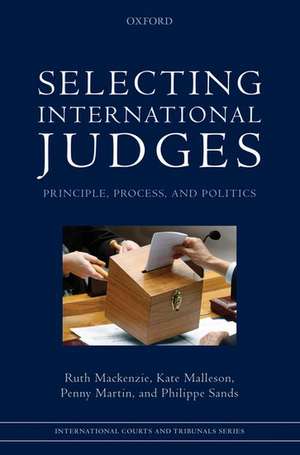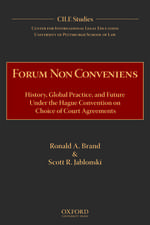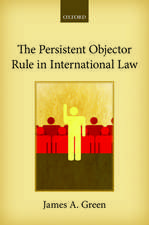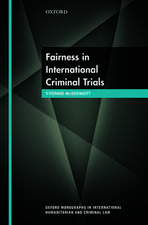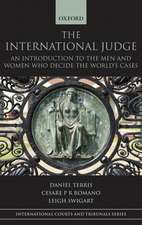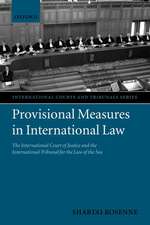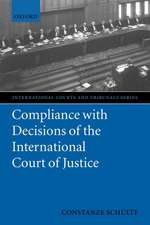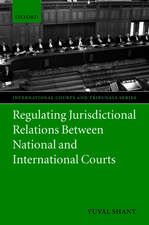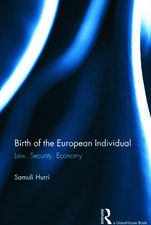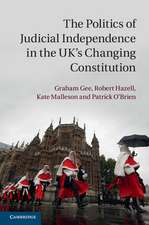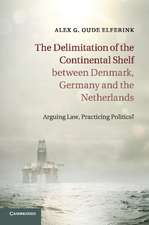Selecting International Judges: Principle, Process, and Politics: International Courts and Tribunals Series
Autor Ruth Mackenzie, Kate Malleson, Penny Martin, Philippe Sands QCen Limba Engleză Hardback – 16 iun 2010
Din seria International Courts and Tribunals Series
- 11%
 Preț: 309.91 lei
Preț: 309.91 lei - 31%
 Preț: 619.45 lei
Preț: 619.45 lei - 14%
 Preț: 733.78 lei
Preț: 733.78 lei - 13%
 Preț: 885.52 lei
Preț: 885.52 lei - 34%
 Preț: 949.48 lei
Preț: 949.48 lei - 27%
 Preț: 491.70 lei
Preț: 491.70 lei - 23%
 Preț: 1441.27 lei
Preț: 1441.27 lei - 34%
 Preț: 820.89 lei
Preț: 820.89 lei - 27%
 Preț: 414.04 lei
Preț: 414.04 lei - 18%
 Preț: 949.47 lei
Preț: 949.47 lei - 30%
 Preț: 736.20 lei
Preț: 736.20 lei - 8%
 Preț: 289.53 lei
Preț: 289.53 lei - 8%
 Preț: 291.38 lei
Preț: 291.38 lei - 30%
 Preț: 863.99 lei
Preț: 863.99 lei -
 Preț: 482.06 lei
Preț: 482.06 lei - 30%
 Preț: 819.66 lei
Preț: 819.66 lei - 17%
 Preț: 221.31 lei
Preț: 221.31 lei - 30%
 Preț: 657.29 lei
Preț: 657.29 lei
Preț: 575.44 lei
Preț vechi: 824.90 lei
-30% Nou
Puncte Express: 863
Preț estimativ în valută:
110.13€ • 114.55$ • 90.91£
110.13€ • 114.55$ • 90.91£
Carte tipărită la comandă
Livrare economică 04-10 aprilie
Preluare comenzi: 021 569.72.76
Specificații
ISBN-13: 9780199580569
ISBN-10: 0199580561
Pagini: 256
Dimensiuni: 162 x 241 x 25 mm
Greutate: 0.54 kg
Editura: OUP OXFORD
Colecția OUP Oxford
Seria International Courts and Tribunals Series
Locul publicării:Oxford, United Kingdom
ISBN-10: 0199580561
Pagini: 256
Dimensiuni: 162 x 241 x 25 mm
Greutate: 0.54 kg
Editura: OUP OXFORD
Colecția OUP Oxford
Seria International Courts and Tribunals Series
Locul publicării:Oxford, United Kingdom
Recenzii
The results of the study are based on an innovative quantitative and qualitative analysis of the nomination and election processes of international courts, focusing on the International Court of Justice (ICJ) and the International Criminal Court (ICC).
Ruth Mackenzie, Kate Malleson, Penny Martin, and Philippe Sands build their case here that, in addition to being a detached and scholarly treatise, theirs is also something of a multicount indictment of the existing modus operandi for selecting international judges, as well as a civilized call to competely rethink how the process of selection should work
...the value of the book lies in the honesty and openness of the interviewees. The anonymous nature of the interviews contributes to the credibility of the information obtained through the interviews...succeeds in revealing and probing the multitude of tensions informing the selection process - the tensions between civil law and common law, national law and international law, East and West, South and North, to name but a few.
Ruth Mackenzie, Kate Malleson, Penny Martin, and Philippe Sands build their case here that, in addition to being a detached and scholarly treatise, theirs is also something of a multicount indictment of the existing modus operandi for selecting international judges, as well as a civilized call to competely rethink how the process of selection should work
...the value of the book lies in the honesty and openness of the interviewees. The anonymous nature of the interviews contributes to the credibility of the information obtained through the interviews...succeeds in revealing and probing the multitude of tensions informing the selection process - the tensions between civil law and common law, national law and international law, East and West, South and North, to name but a few.
Notă biografică
Ruth Mackenzie is senior lecturer in international law at the University of Westminster, London. She was formerly principal research fellow and deputy director of the Centre for International Courts and Tribunals at UCL's Faculty of Laws and remains a senior associate of the Centre. Prior to joining UCL in 2002, Ruth Mackenzie was director of the Biodiversity and Marine Resources programme at the Foundation for International Environmental Law and Development in London.Kate Malleson is Professor of Law at Queen Mary, University of London. Her main research interests are the judiciary, the legal system and the constitution. She has a particular interest in judicial selection processes and the challenge of increasing diversity in the composition of the judiciary. She is the author of a wide range of publications on the judiciary and the legal system including: Appointing Judges in an Age of Judicial Power: Critical Perspectives from Around the World, 2006 (co-editor with Peter Russell), Toronto University Press; The Legal System, 2010, Oxford University Press; and The New Judiciary: The Effects of Expansion and Activism, 1999, Ashgate Press.Penny Martin is an Australian solicitor and researcher. Her main research interests are in public international law, international human rights law and international dispute resolution, with a particular focus on implementation and institutional design. From 2006-2009 she was a Research Fellow at the Centre for International Courts and Tribunals at University College London.Philippe Sands is Professor of Law and Director of the Centre on International Courts and Tribunals in the UCL Faculty of Laws, and a key member of staff in the Centre for Law and the Environment. His teaching areas include public international law, the settlement of international disputes (including arbitration), and environmental and natural resources law. He has previously held academic positions at the University of London's School of Oriental and African Studies, Kings College London and University of Cambridge and was a Global Professor of Law at New York University from 1995-2003. He was co-founder of FIELD (Foundation for International Environmental Law and Development), and established the programmes on Climate Change and Sustainable Development. He is a member of the Advisory Boards of the European Journal of International Law and Review of European Community and International Environmental Law. As a barrister he has extensive experience litigating international cases.
